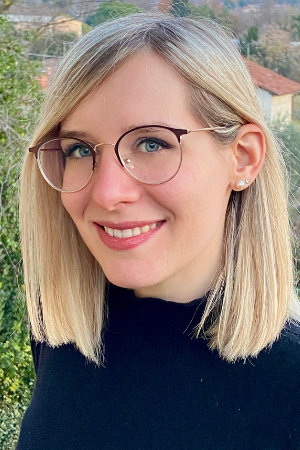Midlands 4 Cities funded PhD student, Anna Persig, tells us more about her experience researching Theology and Religion at the University of Birmingham.

Why did you choose the University of Birmingham as your lead M4C partner institution? Do you receive support from any other university within the consortium?
“The University of Birmingham stood out as the ideal lead M4C institution for my doctoral project because it hosts the Institute for Textual Scholarship and Electronic Editing (ITSEE) which promotes the study of ancient texts by combining philology and technology. I also received joint supervision from the University of Nottingham in order to complete my classical education with a theological background."
Tell us a little bit more about your research project and why you choose to study a PhD in this area?
"I carry out an interdisciplinary research project which encompasses the areas of classics, linguistics and religion studies and combines my interests in ancient languages, such as Greek and Latin, and in the genesis and manuscript tradition of the New Testament. I examine the Latin translations of the New Testament Catholic Epistles with two principal foci: firstly, the relationship with the original Greek text, which enables us to identify the translation techniques employed by the Latin translators and the linguistic features of these versions; secondly, the origin of the Latin Vulgate, the fourth century revision of the previous translations, which is traditionally attributed to Jerome but has an uncertain and disputed authorship in the books of the New Testament outside the Gospels.”
What are the best things about your course?
“I am particularly grateful for the extensive support given by my supervisors who assisted me with competence and expertise in their field of research. As a member of ITSEE, I also received encouragement and suggestions from the other members of the Institute and fellow PhD students in an atmosphere of collegiality and mutual formal and informal support.”
What is life like as an M4C researcher at the University of Birmingham?
“As an international researcher coming from abroad, I always felt welcome and glad to be part of such a diverse and vibrant community. The University is a very stimulating environment: it boasts a comprehensive library with a research suite dedicated to postgraduate students and offers numerous resources to acquire professional skills such as training courses, language classes, forums and research seminars."
What support, from M4C or the University of Birmingham, have you received during your PhD?
“The M4C and University of Birmingham offered generous financial support throughout my doctoral studies. I received funding to undertake a study period abroad and was given the opportunity to attend numerous conferences and summer schools in the United Kingdom and in Europe, which turned out to be valuable opportunities to get feedback on my work and set up international collaborations. The M4C community is a lively and inspiring network with plenty of initiatives and characterised by cooperation between institutions: the annual M4C Research Festival groups together the student cohorts and showcases the wide variety of doctoral projects underway, an event everyone looks forward to!”
Outside of your research, what experience have you gained and how will it help you in the future?
“I was given the opportunity to gain some teaching experience alongside research commitment: I learned how to explain a concept clearly but not in a simplistic manner and get the attention of the audience, skills that are of utmost importance in academic and non-academic jobs.”
What advice would you give someone planning on making an M4C application?
“I would suggest that the applicant chooses carefully the research topic and the most suitable methodology to address the relevant research questions: pick out a topic that stimulates and intrigues you because you are going to put a lot of work and dedication into it and finally become the expert in your subject!”
Find out more about our PhD Theology and Religion programme over on our course pages.